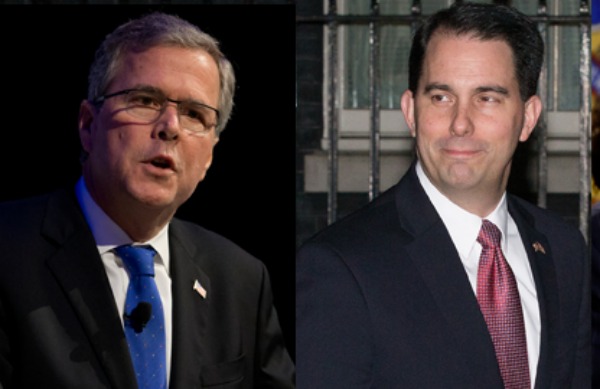This year is just plain weird in a lot of ways. The rise and fall of so many candidates on the Republican side is unprecedented. All of these candidates had bright, shining moments only to be snuffed out by electoral reality:
Remember when Jeb Bush was “inevitable”? Chris Christie seemed to be the key to Blue States … for a while. Then, Scott Walker seemed to be a shoo-in. Ben Carson shot to the top of the polls, then back down. Carly Fiorina made a short splash. And, of course, Marco Rubio, who was billed as the “savior” of the party.
The irony is that Cruz, the only person now really challenging Trump, is the only candidate who was never a big favorite. In fact, Lindsey Graham joked that if someone killed Cruz, and the trial was held in the senate, the killer couldn’t be convicted! Though just today, Graham has now offered support for Cruz after once distancing himself so strongly.
So, what other years have seen skyrocketing candidates fall back to earth? FiveThirtyEight gave us a list of ten (edited for space):
Howard Baker, Republican, 1980: Baker, who had been the Senate minority leader, was more popular in the first half of 1979 than the eventual winner, Ronald Reagan, was. . .
John Glenn, Democrat, 1984: Glenn had a better early net favorable rating than eventual nominee Walter Mondale, even though Mondale was better known. . .
Gary Hart, Democrat, 1988: . . .Hart was a front-runner in early polls and had a solid net favorable rating. Then came the Donna Rice scandal, and Hart dropped out of the race. . .
Doug Wilder, Democrat, 1992: Wilder was looking to become the first African-American candidate nominated by either major party. . . .Wilder didn’t even last to the Iowa caucus.
Phil Gramm, Republican, 1996: Gramm . . .would end up losing the anti-Dole role to Pat Buchanan, who had an awful early net favorable rating. Gramm won no primaries.
Elizabeth Dole, Republican, 2000: . . .Her early net favorable ratings were identical to Barack Obama’s in 2007, but she. . .was out of the race by October 1999.
Joe Lieberman, Democrat, 2004: He had a better net-favorable-to-name-recognition ratio than eventual nominee, John Kerry. Lieberman was done in by his pro-Iraq War stance.
John Edwards, Democrat, 2008: . . . favorable rating in early 2007 was only 1 percentage point lower than Obama’s, He placed second in Iowa. . .and his campaign was over.
Rudy Giuliani, Republican, 2008: “America’s mayor”. . .may be the biggest dud on this list. [Even with high favorability] Giuliani never came close to winning a single primary.
Tim Pawlenty, Republican, 2012: net-favorable-to-name-recognition ratio was better than front-runner Mitt Romney’s. Pawlenty, though, was…well, dull. . .[lost in Iowa and quit.]
OK—so, what about longshot candidates who made a difference. There’s this from USA Today (edited for space):
1. Wendell Willkie (1940) Willkie [in 1940 to] Franklin Roosevelt. But he made the Republican Party more internationalist, little more than a year before Pearl Harbor.
2. Ronald Reagan (1968, 1976) Reagan. . .left his conservative mark on the party both times. . .[forced] Richard Nixon to the right, which included [his]“Southern strategy.”
3. Eugene McCarthy (1968). . .toppled a president during the tumultuous year of 1968. . .McCarthy showed the power of primaries to upset the establishment.
4. George McGovern (1972). . .won the Democratic nomination in 1972. How? In part by taking advantage of new rules requiring more women and minority delegates.
5. Jimmy Carter (1976) Carter took advantage of the proliferation of primaries to win the Democratic nomination. His first victory came in a then little-known. . .Iowa caucuses.
6. George H.W. Bush (1980) [The] main challenger to Ronald Reagan and became the Gipper’s running mate. Bush’s credible run in 1980 preserved his political career
7. Gary Hart (1984, 1988) [Lost due to] allegations of an extramarital affair. . .“Character issues” and “scandal politics” have been a factor in presidential races ever since.
8. Jesse Jackson (1984, 1988) his two campaigns changed the party. Jackson galvanized minority voters, forcing other Democratic candidates to address African-American issues.
9. Pat Buchanan (1992) Some of his criticism of Bush was exploited by independent candidate Ross Perot as well as the winner of the 1992 election, Bill Clinton.
10. John McCain (2000) McCain defeated the better-funded, more-endorsed George W. Bush. . .McCain challenge reflected ideological disputes that still roil the GOP.
The point is, early winners can be losers, and even “also-rans” can have an impact in politics.
Donate Now to Support Election Central
- Help defend independent journalism
- Directly support this website and our efforts
